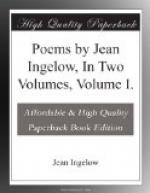The skiff was like a crescent, ghost of some moon
departed,
Frail, white, she rocked and curtseyed
as the red wave she crossed,
And the thing within sat paddling, and the crescent
dipped and darted,
Flying on, again was shouting, but the
words were lost.
I said, “That thing is hooded; I could hear
but that floweth
The great hood below its mouth:”
then the bird made reply.
“If they know not, more’s the pity, for
the little shrew-mouse knoweth,
And the kite knows, and the eagle, and
the glead and pye.”
And he stooped to whet his beak on the stones of the
coping;
And when once more the shout came, in
querulous tones he spake,
“What I said was ‘more’s the pity;’
if the heart be long past hoping,
Let it say of death, ‘I know it,’
or doubt on and break.
“Men must die—one dies by day, and
near him moans his mother,
They dig his grave, tread it down, and
go from it full loth:
And one dies about the midnight, and the wind moans,
and no other,
And the snows give him a burial—and
God loves them both.
“The first hath no advantage—it shall
not soothe his slumber
That a lock of his brown hair his father
aye shall keep;
For the last, he nothing grudgeth, it shall nought
his quiet cumber,
That in a golden mesh of his callow
eaglets sleep.
“Men must die when all is said, e’en the
kite and glead know it,
And the lad’s father knew it, and
the lad, the lad too;
It was never kept a secret, waters bring it and winds
blow it,
And he met it on the mountain—why
then make ado?”
With that he spread his white wings, and swept across
the water,
Lit upon the hooded head, and it and all
went down;
And they laughed as they went under, and I woke, “the
old man’s daughter.”
And looked across the slope of grass,
and at Cromer town.
And I said, “Is that the sky, all gray and silver-suited?”
And I thought, “Is that the sea
that lies so white and wan?
I have dreamed as I remember: give me time—I
was reputed
Once to have a steady courage—O,
I fear ’tis gone!”
And I said, “Is this my heart? if it be, low
’tis beating
So he lies on the mountain, hard by the
eagles’ brood;
I have had a dream this evening, while the white and
gold were fleeting,
But I need not, need not tell it—where
would be the good?
“Where would be the good to them, his father
and his mother?
For the ghost of their dead hope appeareth
to them still.
While a lonely watch-fire smoulders, who its dying
red would smother,
That gives what little light there is
to a darksome hill?”
I rose up, I made no moan, I did not cry nor falter,
But slowly in the twilight I came to Cromer
town.
What can wringing of the hands do that which is ordained
to alter?
He had climbed, had climbed the mountain,
he would ne’er come down.




